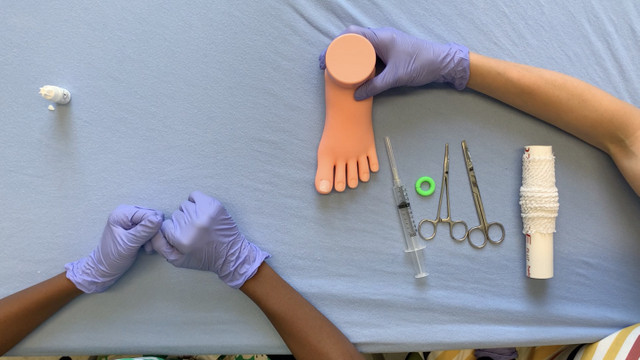Use this homemade trainer to improve your skills for patients with a painful toe.
Most emergency physicians occasionally see patients with ingrown toenails. Conservative management of mild cases includes soaking the foot in warm water, use of topical antibiotics, proper nail-trimming technique and elevation of the corner of the nail.[1]
For more severe cases, partial or complete nail excision speeds healing and helps prevent recurrence.[2] This can be a time-consuming endeavor on a busy shift, especially for a less experienced physician.
Most emergency medicine trainees learn to remove ingrown toenails in real time on live patients, with a more senior physician supervising the process step-by-step. Patients usually feel anxious about having part or all of a toenail removed, making for a challenging learning environment. In addition, the great toe can be difficult to bandage effectively.

We set out to create an affordable trainer to teach the procedure in a simulation setting. A medical student teaching session was planned and settled on a straightforward approach for ingrown toenail removal and dressing. We ordered supplies online, including a silicone foot, plastic toenails, superglue, equipment for a digital nerve block, a roll of tubular gauze, a PVC pipe and a plastic vaginal speculum.

Also, we were able to obtain samples of a digital tourniquet and used a Kelly clamp and scissors from our teaching supply storage. For each participant, we glued an acrylic press-on nail to the nail bed of the silicone foot’s great toe. The learner prepared the toe by applying a tourniquet and performing a digital nerve block.
Several different removal techniques can be demonstrated with the trainer. We taught partial removal, but the trainer can also demonstrate complete removal. We taught learners to apply a tubular gauze bandage using the “digi-speculum” technique with a vaginal speculum or PVC pipe.[3]

Once all the materials were gathered and assembled, each individual teaching session took five- to 10-minutes. An assistant was required to hold the silicone foot while the learner practiced the procedure. If an assistant is not available, weight can be added to the silicone foot, or it can be anchored down.
Glue build-up on the nail bed made it difficult to attach a new acrylic nail to the same toe after several uses. Acetone removes the build-up nicely. Colored acetone will stain the foot, so we recommend using a clear version. The trainer is reusable, with the only need being to replace the disposable acrylic press-on nail after each procedure. The total cost of the toenail removal trainer was $60.

We made a video demonstration of the trainer in use:
Materials for the Ingrown Toenail Removal Trainer
| Item | Link | Price |
| Foot Model | https://www.amzn.com/B07V377V55 | $10 |
| Acrylic press-on nails | https://www.amzn.com/B009AEIBB2 | $6 |
| Digital tourniquet | https://marmed.com/products/tourni-cot/ | Sample |
| 5cc syringe | https://www.amzn.com/B013C03JFW | $7 |
| 27g needle | https://www.amzn.com/B01HJ2B8M0 | $5 |
| Ingrown toenail kit | https://www.amzn.com/B01M7U6IZ3 | $9 |
| Tubular gauze | https://www.amzn.com/B0002DM1AM | $7 |
| PVC pipe | https://www.amzn.com/B086VQFZKM | $9 |
| Speculum | https://www.amzn.com/B07C1569YN | $7 |
| Total | $60 |
Ingrown Toenail Removal Trainer
Step by step instructions:
- Place the foot model on a flat, stable surface.
- Cover the great toenail bed with a thin layer of cyanoacrylate superglue.
- Place the acrylic nail over the nail bed and press it down for 10 seconds.
- Perform a digital nerve block.
- Place the digital tourniquet over the digit.
- Remove the nail using your preferred method.
- Remove the digital tourniquet.
- You can now practice bandaging the toe. We used the “digi-speculum” technique:
- Place tubular gauze over a portion of PVC pipe or a plastic vaginal speculum.
- Slide the gauze-covered PVC pipe or speculum around the digit.
- Grab the end of the gauze at the proximal part of the digit and slide the PVC pipe or speculum away from the digit.
- Rotate the PVC pipe or speculum 360º, then slide the gauze-covered PVC pipe or speculum back around the digit.
- Repeat steps 8b to 8d three to five times,[3] then pull the PVC pipe or speculum away completely.
- Create flaps for a sling by cutting gauze lengthwise towards the digit, leaving uncut a portion of gauze long enough for the digit. Slide the gauze back towards the digit and tie the flaps around the ankle to secure the sling.
References
- Zuber TJ, Pfenninger JL. Management of ingrown toenails. Am Fam Physician. 1995;52(1):181-190.
- Mayeaux EJ Jr, Carter C, Murphy TE. Ingrown Toenail Management. Am Fam Physician. 2019;100(3):158-164.
- Lin M. Trick of the Trade: The Digi-speculum. ALiEM. Published July 22, 2009. Accessed February 18, 2022. https://www.aliem.com/trick-trade-digi-speculum-finger/




1 Comment
This is very clearly written, easy to understand and highly informative!! It should be recommended reading especially for urgent care providers!